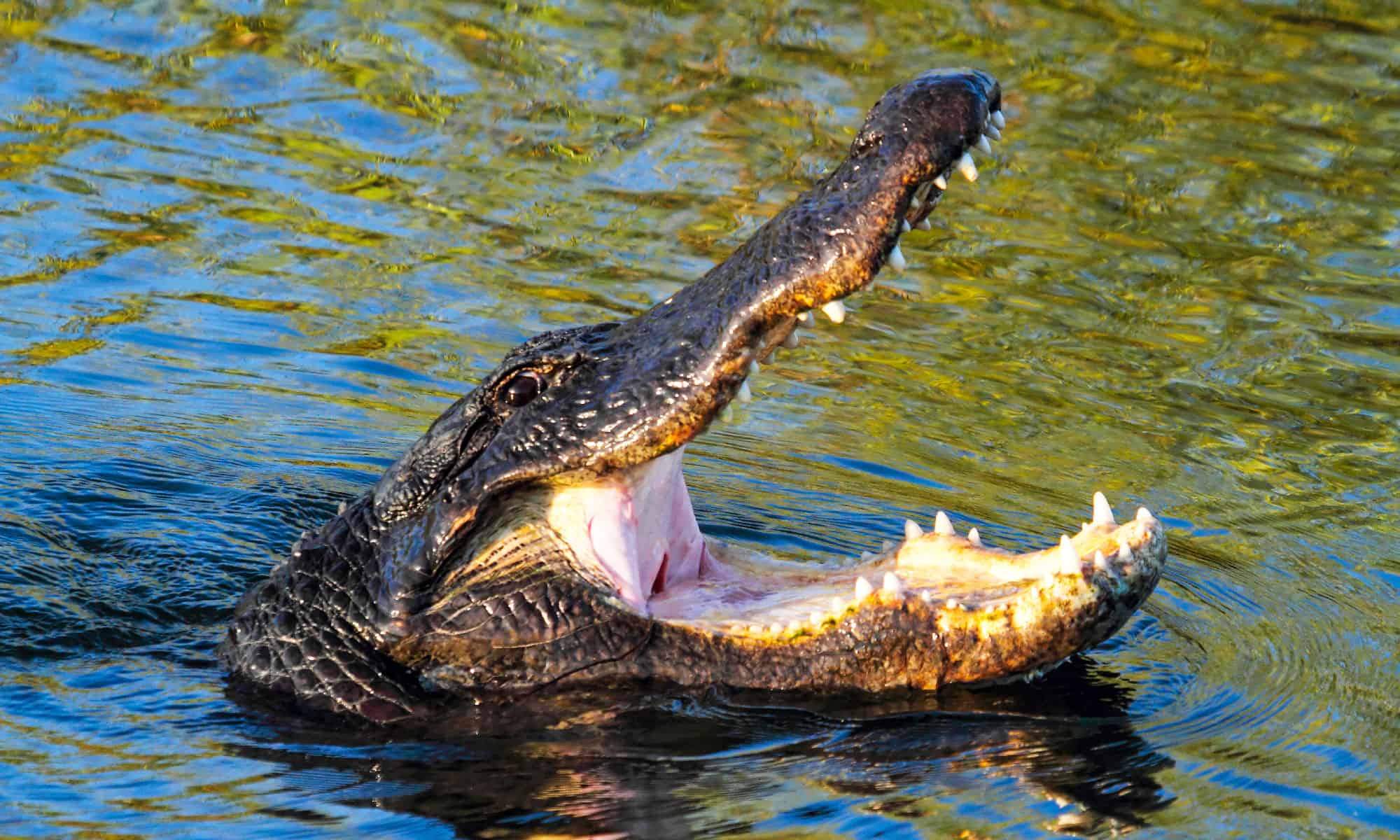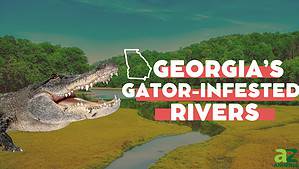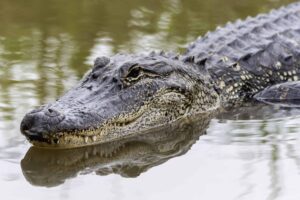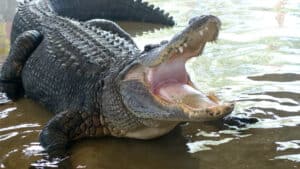South Carolina possesses about 683 square miles of lakes and 370,000 acres of reservoirs, both prime habitats for alligators. As semi-aquatic reptiles, sources of calm water attract alligators. About 100,000 alligators reside in South Carolina. Many water sports and recreation enthusiasts may be questioning alligators in South Carolina: is it safe to swim?
Alligator Hunting Habits
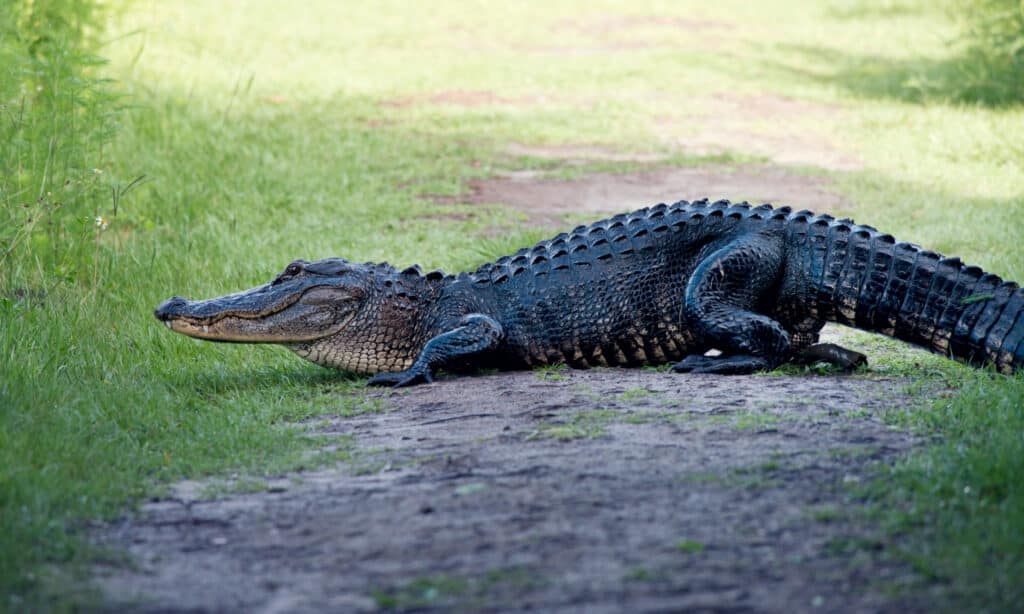
Because alligators are cold-blooded, they only need to hunt once or twice a week.
©Svetlana Foote/Shutterstock.com
When looking at an alligator, their size can be pretty intimidating. Ranging from 10-15 in length, the most enormous alligator ever found in South Carolina was 13 feet and 6 inches. And this reptile weighed 1,025 pounds! That is not a creature you want to bump into in the water. The alligator has short, stubby legs and webbed back feet to help it swim easily through water, especially shallow water. However, this makes pursuing prey on land tough. That is why alligators adapted as opportunistic predators.
Hiding in thick undergrowth and usually hunting at night, alligators wait for prey to draw close and then capture it in their mighty jaws! An adult alligator’s jaw strength can be as much as 2,000 PSI! For large prey, an alligator pulls it underwater, where the prey is drowned and devoured. A neat feature of the alligator is its glottis, which is located at the back of the throat. It prevents water from flowing back and getting into the alligator’s lungs. The glottis allows alligators even to snatch prey fully immersed underwater.
Alligators prefer things that they can devour quickly. Most of their diet will consist of birds, amphibians, fish, and small mammals. Because alligators are cold-blooded, they only need to hunt once or twice a week. But, it is possible for alligators to live off their fat reserves for up to two years.
Some may be wary of going into the water, given an alligator’s hunting habits and techniques. So, looking at alligators in South Carolina, we have to decide if it is safe to swim.
The Concentration of Alligators in South Carolina
In South Carolina, a high concentration of alligators is along the state’s coastal marshlands. The ACE Basin is one of the more popular nesting sites for alligators. Hilton Head Island is also home to 2,000-4,000 native alligators, and the island is filled with lush lagoons and ponds, which the alligators enjoy.
Overall, you don’t see many alligators upstate in South Carolina. Usually, alligators live south of Saluda, Newberry, Fairfield, and Lancaster counties. But, some of the major lakes, like Lake Marion and others, are known to be alligator infested.
Alligators in South Carolina: Is It Safe to Swim?
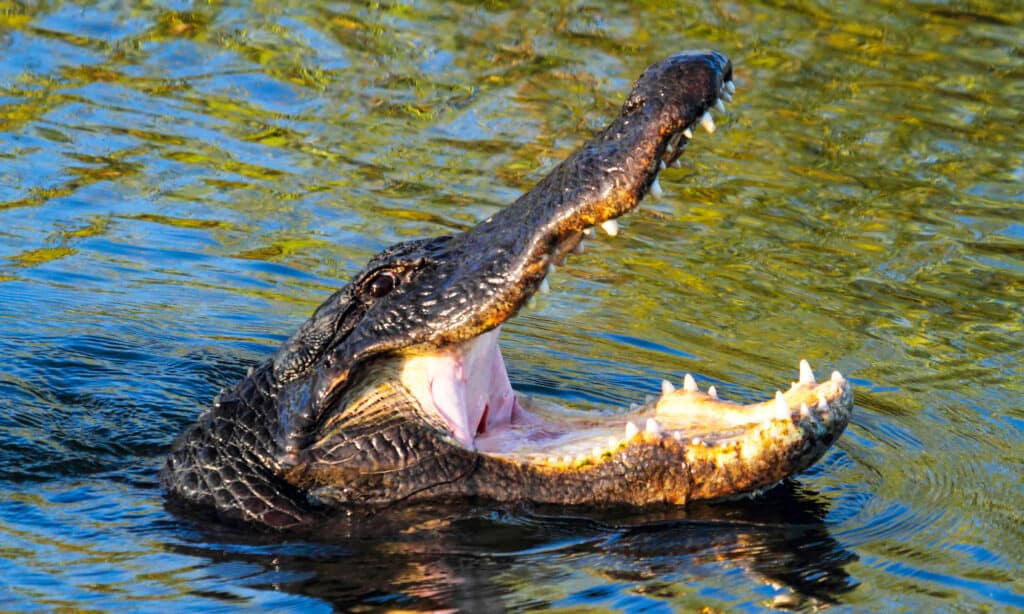
When considering alligators in South Carolina and if it’s safe to swim, choose areas with clear shorelines.
©Steve Byland/Shutterstock.com
As far as swimming goes, pools are the safest bet to ensure it’s alligator-free. Many pool areas are fenced or have a wall perimeter, keeping alligators from getting in. And, of course, you can see all the way to the bottom of a pool, so you will know if something is underwater! But, when it comes to natural water areas, protect yourself swimming by following these guidelines:
- Don’t go swimming in canals or ponds, as they have the shallow shorelines alligators enjoy.
- Because alligators mostly hunt at night, don’t go swimming at night.
- Swim in lakes or rivers with good visibility. Alligators use shorelines with heavy vegetation to ambush prey or escape the hot sun.
- Don’t go swimming alone. Stick with popular spots or go swimming with a group of people. That’s more eyes to look for danger, and the noise will frighten away an alligator.
To see a list of the best swimming holes in South Carolina, check out this post.
Escaping Alligator Encounters
Even though there is much fear surrounding alligators, alligators are pretty afraid of humans. When they hear us coming, they give us a wide berth! In fact, since 2000, there have only been five recorded alligator attack fatalities in South Carolina, according to the Post and Courier. And despite the concentration of alligators in the state, South Carolina residents experience more shark attacks than alligator attacks.
If You Are Attacked…
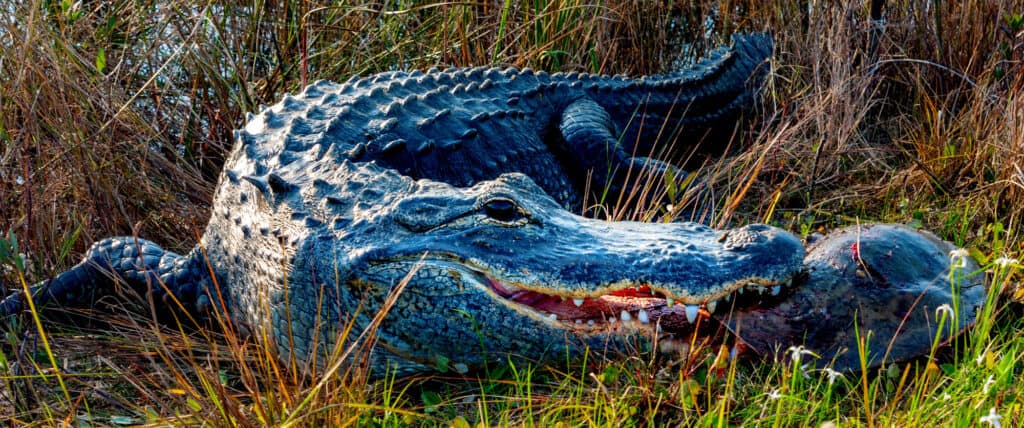
Alligators are poor pursuit predators and have the disadvantage out of water.
©Peter Aronson/Shutterstock.com
It is unlikely to happen, but if you struggle with an alligator, be very combative. Alligators are looking for an easy meal. If they think it’s going to cost too much energy, they’ll be the first to give up.
An alligator has a strong bite, so trying and prying it open is pretty useless. But alligators are sensitive on their snouts, eyes, and jaw joint. Hitting them hard in these areas may get them to release you.
Another option is to trigger the gag reflex by shoving something to the back of the alligator’s throat. This will also get the jaws to open, giving you a chance to escape. Get out of the water and run to land. Alligators are poor pursuit predators and have the disadvantage out of water.
Swimming Safely with South Carolina Alligators
By scouting areas before you swim and keeping to well-known spots, you can savor the outdoor swimming experience. So when you think about alligators in South Carolina and if it’s safe to swim, it is usually okay if you follow the safety rules!
Thank you for reading! Have some feedback for us? Contact the AZ Animals editorial team.

